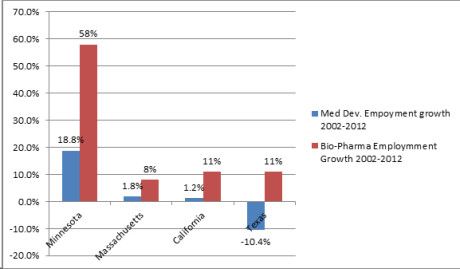Where we’ve been:
Does it feel like we’ve been slugging it out in the life sciences industry? Yes, but…U.S. growth in the life sciences industry has been robust in recent years despite the overall economic downturn. The 15-year total shareholder return (1998–2012) for U.S. med tech companies was 7.8 percent compared to 5.2 percent for the Standard & Poor’s 500.(1) Employment in both medical devices and bio-pharma posted growth between 2002 and 2012. Growth during that period is shown in Figure 1 for selected states with high concentrations of such jobs. (2,3)
In recent years, the life sciences industry has been seeking talent. Within the Pharma/Biotech/Medical Equipment sector, 77% of respondents indicated that there was a shortage of skilled candidates to fill available jobs. According to a 2014 North American Staffing and Recruiting Trends report published by Bullhorn, it takes 34 days to fill a direct hire role within that sector. That’s in the top 15% of industries measured. (The highest are Telecommunications at 36 days and Healthcare at 39 days.) (4)
Disruptive changes:
Despite the economic downturn that has plagued the U.S. economy since 2008, U.S. life science companies have been fairing exceedingly well. (2) But is the past robust growth in the life sciences consistent with what we can expect in the future? Perhaps not. A report recently issued by Deloitte highlighted the significant changes that will affect our life sciences and med tech industries going forward: reimbursement, the buying process, innovation, and the complexity of the marketplace. (1) Companies that re-align their strategies and business models to accommodate these changes will thrive. Those that don’t, won’t.
Deloitte notes that both the increasing complexity of FDA approval and challenging reimbursement hurdles have made investment in the life sciences and medical device industries less attractive in recent years. The decrease in investment in these companies is likely to affect their ability to innovate to address unmet clinical needs – and will, of course also have an impact on jobs.
Biopharma is said to be a “highly volatile and unpredictable sector due to the technically intensive nature of the industry” according to the online trade publication, BioSpace. The pharmaceutical sector’s outsourcing of U.S. jobs overseas and the “patent cliff” associated with many once-profitable drugs have spurred companies to funnel their budget to alternative research models and turn to emerging markets for growth. (2)
The offshoring of jobs in the medical devices and diagnostic sector has also intensified, in part, perhaps, to counteract the reduced profits associated with the implementation of the medical device tax in 2013. Because regulatory rules and taxes tend to be less restrictive outside the U.S., large companies have focused on outsourcing jobs overseas to cut costs in the areas of processing, manufacturing and production. Today, U.S. life science and med tech companies serve 40-46 percent of all medical devices globally. As companies look to emerging markets for growth, they may find that new local regulations and cultural differences can limit market access. And new markets are also fueling the growth of new competitors in Israel, China and other areas not previously identified as manufacturers of medical devices. (1) According to RnR Market Research, China’s medical device market will grow over 250% between 2012 and 2020. (5)
So what’s the story?
The life sciences industry has established a healthy trajectory which should bode well for job seekers in coming years. But there are undeniable environmental factors that have the potential to become major game changers, including increasing pressures to contain costs, movement toward sourcing both materials and services globally, decreasing interest in accepting the high level of risk associated with life science start-ups, and increasing competition from companies outside the U.S.
How should life sciences job seekers respond?
- Be current with trends and re-tool your skills and certifications as warranted.
- Be a life-long learner, acquiring new skills as necessary to help life science companies cope with significant environmental pressures.
- Understand how changes such as requirements for more rigorous clinical data may affect life sciences employers and your ability to be hired.
- Be globally minded.
- Become cross-culturally competent. Be prepared to interact with global partners and to consider possible barriers to acceptance and adoption of pharmaceuticals and medical devices in non-western cultures.
- Be flexible. Many companies are holding the line on their headcount while acquiring needed skills on contract. Non-traditional working relationships may be a major jobs trend in our economy going forward, regardless of the industry.
How should life sciences companies respond?
- Understand and respond appropriately to changes in your environment, especially those relating to: reimbursement, the buying process, innovation and the complexity of the marketplace.
- Be nimble; assemble the kind of talent needed to respond to these changes. Consider staffing alternatives to traditional employment arrangements, such as retaining project leaders and team members on a project-by-project basis.
- Establish metrics to determine which cost-cutting initiatives are actually effective and which result in re-work and delay. Change Company practices accordingly.
- Be globally minded. Take note of trends that will impact your business. Invest in training to increase cross-cultural competence in executives and key employees.
- Understand that opening new markets for your products may mean the increase of competition from new companies emerging from those markets.
To learn more about how Talencio has helped other life science companies with capacity and expertise needs, contact us directly at 612.703.4236 or email to:pnorbom@talencio.com. Talencio, LLC is the preferred provider of vetted, accomplished professionals to the Life Sciences community.
Sources
1 Deloitte University Press. The Three Rules in Medical Technology: The Transformation of an Industry. December, 2013.
2 Data for medical device employment trends from MassBio.org, slide 9.
4 Bullhorn. A Numbers Game: North American Staffing and Recruiting Trends Report. 2014.
5 Medical device market lukewarm in 2014, Healthcare Finance News, Jan 2, 2014.
